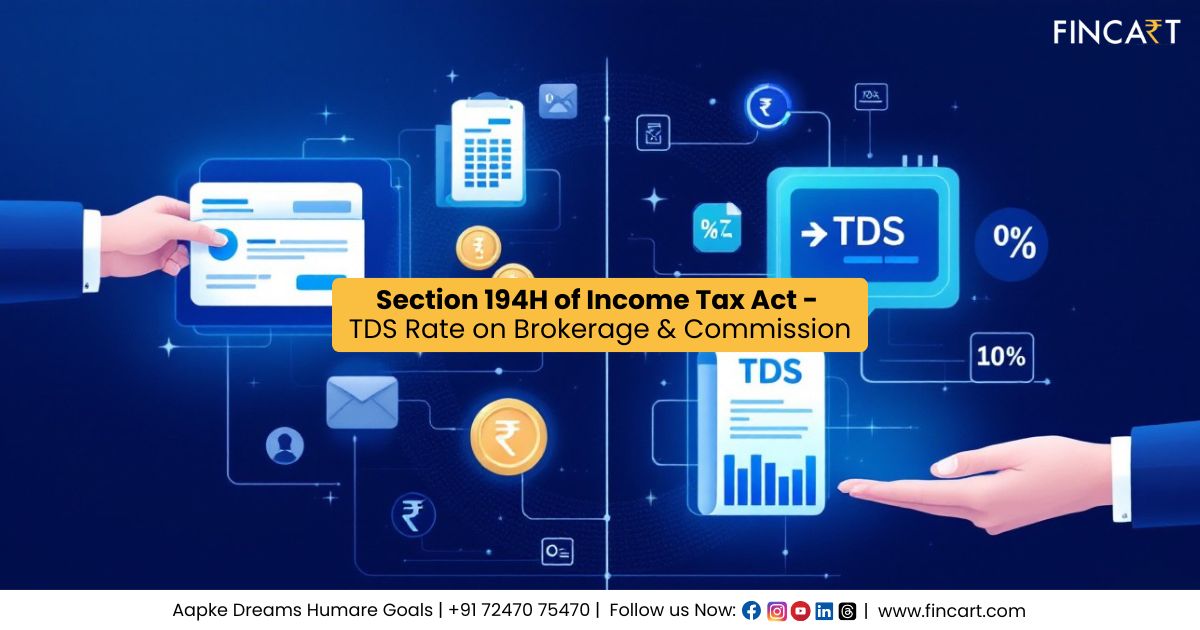Tax Deducted at Source (TDS) is a vital mechanism in India’s taxation framework. By ensuring that taxes are collected at the very source of income, it reduces the chances of tax evasion and promotes smoother compliance. Among the various provisions under the Income Tax Act, Section 194H specifically deals with the TDS rate on brokerage and commission.
This section is particularly important for businesses and individuals where commissions and brokerage form a major part of financial transactions. Understanding Section 194H not only helps in avoiding penalties but also enables smarter tax planning and cash flow management.
In this blog, we will cover:
- The applicability and scope of Section 194H
- The prescribed TDS rates and threshold limits
- Exemptions and compliance requirements
- Recent updates and changes
- How expert tax consulting services and a professional tax planner can simplify compliance
What is Section 194H of the Income Tax Act?
Section 194H deals with TDS on income earned through commission or brokerage. According to this section, any person (excluding certain individuals and HUFs) responsible for paying commission or brokerage exceeding the specified threshold amount to a resident is required to deduct TDS at the prescribed rates.
Definition of Commission or Brokerage
The Income Tax Act defines commission or brokerage as any payment received or receivable, directly or indirectly, by a person acting on behalf of another person. It covers:
- Services rendered, except professional services.
- Services provided in the course of buying or selling goods.
- Any services related to transactions concerning valuable articles, assets, or property (other than securities).
This broad definition ensures that most forms of agency-based income come under the ambit of TDS under Section 194H.
Applicability of Section 194H
Section 194H applies when:
- A payer (individual, company, firm, partnership, etc.) is responsible for paying commission or brokerage to a resident payee.
- The total commission or brokerage paid exceeds the prescribed threshold limit.
- The payer is not an individual or HUF, unless they are required to get their accounts audited under Section 44AB (i.e., turnover exceeding ₹1 crore in case of business, or professional receipts exceeding ₹50 lakhs).
This provision ensures that businesses with significant turnover or professional income also fall under the scope of Section 194H.
TDS Rate on Brokerage under Section 194H
The TDS rate on brokerage and commission has undergone significant changes in recent years. Staying updated on these changes is crucial for both payers and recipients.
Current Rates
| Period | TDS Rate |
| Before 01/10/2024 | 5% |
| On or after 01/10/2024 | 2% (as per Union Budget 2024 amendment) |
| If PAN not provided | 20% (higher rate as per Section 206AA) |
Important Points:
- The rate of 2% is a major relief introduced in Budget 2024, effective from 1st October 2024.
- No surcharge or cess is added to these rates – the rate is applied directly on the commission or brokerage.
- If PAN of the payee is not furnished, TDS must be deducted at the much higher rate of 20%.
Threshold Limit for TDS under Section 194H
The threshold limit specifies the minimum amount below which no TDS needs to be deducted.
| Period | Threshold Limit |
| Before 01/04/2025 | ₹15,000 |
| On or after 01/04/2025 | ₹20,000 |
This means, if the total commission or brokerage paid during a financial year does not exceed the threshold, no TDS needs to be deducted.
Exemptions from Section 194H
There are certain payments where TDS is not applicable under Section 194H:
- Commission paid to insurance agents (covered under Section 194D).
- Payments made by RBI to banking companies.
- Brokerage related to public issue of securities.
- Brokerage or commission on transactions in securities listed on stock exchanges.
- Payments towards LIC or other cooperative society investments.
- Income from motor accident compensation awarded by the Tribunal.
- Payments made by BSNL/MTNL to their PCO franchisees.
These exemptions ensure that certain regulated or special transactions are not burdened with additional compliance.
Time of Deduction of TDS
TDS under Section 194H must be deducted:
- At the time of credit of such income to the account of the payee, even if it is credited to a suspense account.
- Or, at the time of actual payment, whichever is earlier.
This prevents tax leakage by ensuring deduction either on accrual or payment, whichever comes first.
Due Dates for Depositing TDS
Timely deposit of TDS is critical. The general rules are:
- TDS deducted in a month must be deposited by the 7th of the next month.
- For TDS deducted in March, the due date is 30th April of the next financial year.
Failure to deposit TDS on time can lead to interest, penalties, and even disallowance of expenses under the Income Tax Act.
Filing and Compliance Requirements
TDS Certificates
The deductor must issue a TDS certificate in Form 16A to the payee, which contains details of tax deducted and deposited. This helps the payee claim credit while filing their income tax return.
TDS Returns
The deductor must also file a quarterly TDS return using Form 26Q, giving details of all deductions made.
Non-Compliance Consequences
- Interest: 1% per month for late deduction, and 1.5% per month for late deposit.
- Penalty: Can be equal to the amount of TDS not deducted or deposited.
- Disallowance of expenses: Commission or brokerage payments may be disallowed as business expenses if TDS compliance is not met.
Lower or NIL Rate of TDS under Section 197
The payee can apply to the Assessing Officer for a certificate of lower deduction or NIL deduction under Section 197. Once approved, the payer can deduct tax at the rate specified in the certificate.
Documents generally required include:
- PAN details,
- Income tax returns of previous years,
- Details of income, projected income, and taxes paid,
- Purpose and nature of commission income.
This provision is particularly useful for agents or brokers with low overall tax liability.
Practical Example
Suppose a company pays ₹50,000 as brokerage to an agent in December 2024.
- Since the date is after 01/10/2024, the applicable TDS rate = 2%.
- TDS to be deducted = ₹50,000 × 2% = ₹1,000.
- Net payment to agent = ₹49,000.
- ₹1,000 must be deposited with the Income Tax Department by 7th January 2025.
If the agent fails to provide PAN, TDS would be deducted at 20% = ₹10,000.
Importance of Professional Tax Planning Services
While Section 194H might look straightforward, non-compliance or misinterpretation can lead to penalties and disputes. This is where professional tax consulting services and tax planning services add value.
A good tax planner can help:
- Determine applicability of Section 194H.
- Ensure correct deduction and deposit of TDS.
- Avoid excess deductions where exemptions apply.
- Plan cash flows by factoring in TDS deductions.
- File accurate TDS returns and avoid penalties.
For businesses that deal with high-volume commission or brokerage transactions (e.g., financial services, real estate, distribution, and agency models), working with experts ensures seamless compliance and better financial efficiency.
Key Takeaways
- Section 194H applies to commission and brokerage payments exceeding the threshold.
- TDS rate on brokerage has been reduced from 5% to 2% effective 1st October 2024.
- Threshold limit is ₹15,000 until 31st March 2025, and increases to ₹20,000 from 1st April 2025.
- PAN is mandatory, else TDS is deducted at 20%.
- Exemptions exist for specific transactions (like insurance commission, stock exchange trades, LIC payments, etc.).
- Non-compliance can attract interest, penalties, and disallowance of expenses.
- Professional tax consulting services and a tax planner help businesses stay compliant and optimize tax outflows.
Conclusion
Section 194H of the Income Tax Act is a critical provision for those making or receiving commission and brokerage payments. With the revised TDS rate on brokerage and the enhanced threshold limit, compliance is now simpler and less burdensome. However, overlooking timelines, thresholds, or documentation can lead to severe penalties.
For businesses and individuals alike, it is prudent to take the help of expert tax consulting services or an experienced tax planner to ensure smooth compliance, accurate deductions, and effective tax planning. At Fincart, we specialize in providing holistic financial solutions, from tax planning services to long-term wealth management, ensuring your money works as efficiently as you do.




